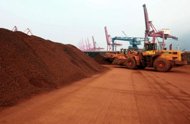Japan, US, and EU to meet on rare earths

Japan's industry ministry said the March 28 talks in Tokyo will see government officials, researchers and business leaders also discuss ways to reduce their reliance on the commodities as well as recycling methods.
The talks come weeks after the three complained to the World Trade Organization that China was monopolising supply of rare earths -- 17 elements used to make a range of high tech products, from smartphones to missiles.
"Turbulent price trends for rare earth elements in recent years have led to a very unstable manufacturing base for high-technology products," a ministry statement said.
"It is therefore necessary to overcome this vulnerability by developing technologies for alternative or substitute critical materials, and to reduce use of critical materials as soon as possible."
US Energy Secretary Steven Chu, EU Ambassador to Japan Hans Dietmar Schweisgut, and Japanese Industry Minister Yukio Edano will be among those at the talks.
The participants "will introduce their policies and efforts so that a common recognition of the importance of a stable supply of critical materials, including rare earth elements, toward future industry development can be achieved," it said.
US President Barack Obama on March 13 hit out at China for limiting exports of rare earths, as the Unite States, European Union and Japan lodged their joint complain at the WTO.
They claim China -- which produces about 97 per cent of the world's supply of rare earths -- is unfairly benefiting its own industries by restricting exports.
Beijing has argued that its controls, which include export duties and quotas, are necessary to help conserve the highly sought-after natural resources, limit environmental damage from excessive mining and to meet domestic demand.
What the stars mean:
★ Poor ★ ★ Promising ★★★ Good ★★★★ Very good ★★★★★ Exceptional
Latest News
More News
- Foreign leaders extend congratulations to Party General Secretary To Lam (January 25, 2026 | 10:01)
- Russian President congratulates Vietnamese Party leader during phone talks (January 25, 2026 | 09:58)
- Worldwide congratulations underscore confidence in Vietnam’s 14th Party Congress (January 23, 2026 | 09:02)
- Political parties, organisations, int’l friends send congratulations to 14th National Party Congress (January 22, 2026 | 09:33)
- 14th National Party Congress: Japanese media highlight Vietnam’s growth targets (January 21, 2026 | 09:46)
- 14th National Party Congress: Driving force for Vietnam to continue renewal, innovation, breakthroughs (January 21, 2026 | 09:42)
- Vietnam remains spiritual support for progressive forces: Colombian party leader (January 21, 2026 | 08:00)
- Int'l media provides large coverage of 14th National Party Congress's first working day (January 20, 2026 | 09:09)
- Vietnamese firms win top honours at ASEAN Digital Awards (January 16, 2026 | 16:45)
- ASEAN Digital Ministers' Meeting opens in Hanoi (January 15, 2026 | 15:33)
















 Mobile Version
Mobile Version